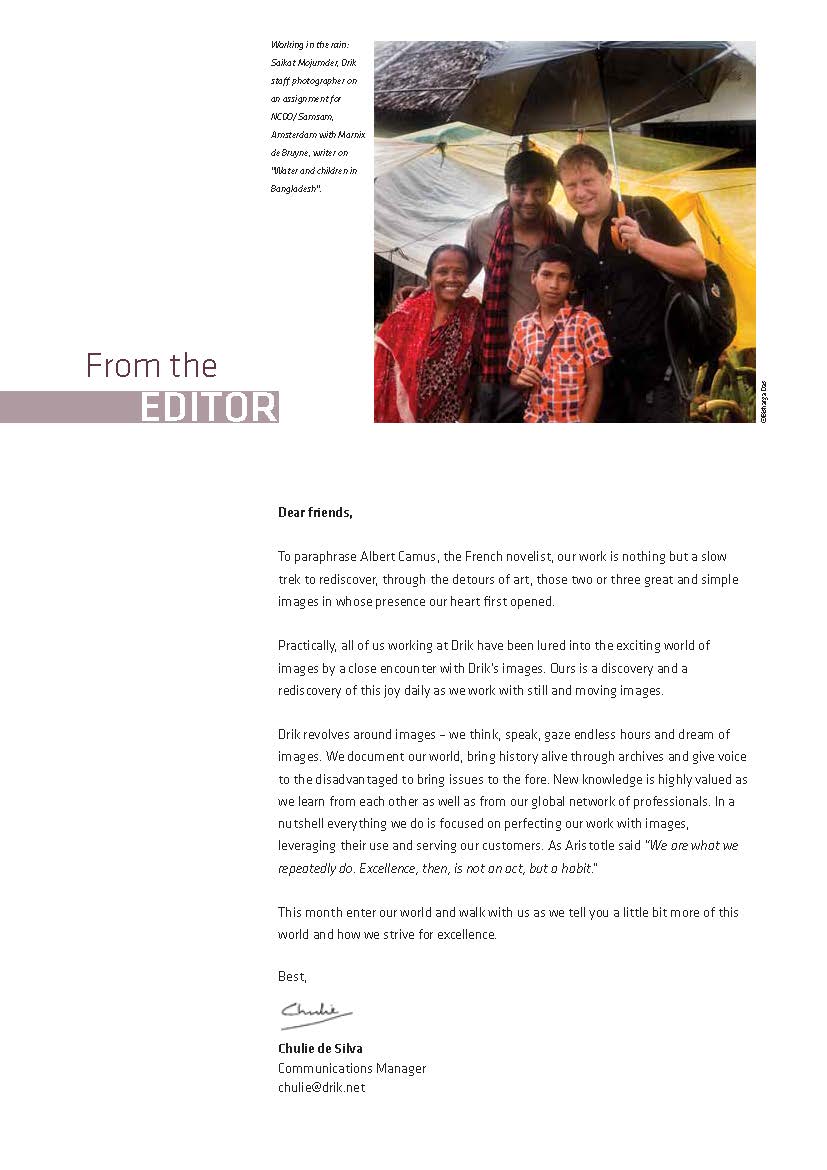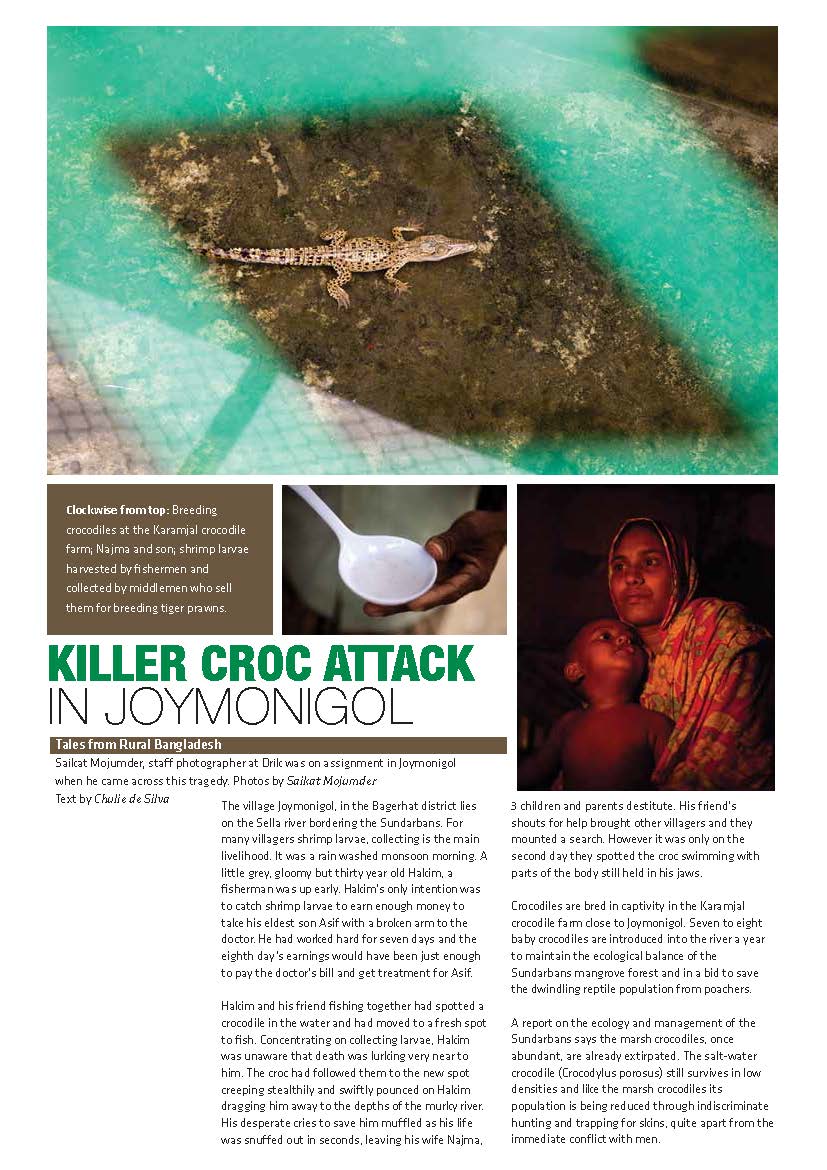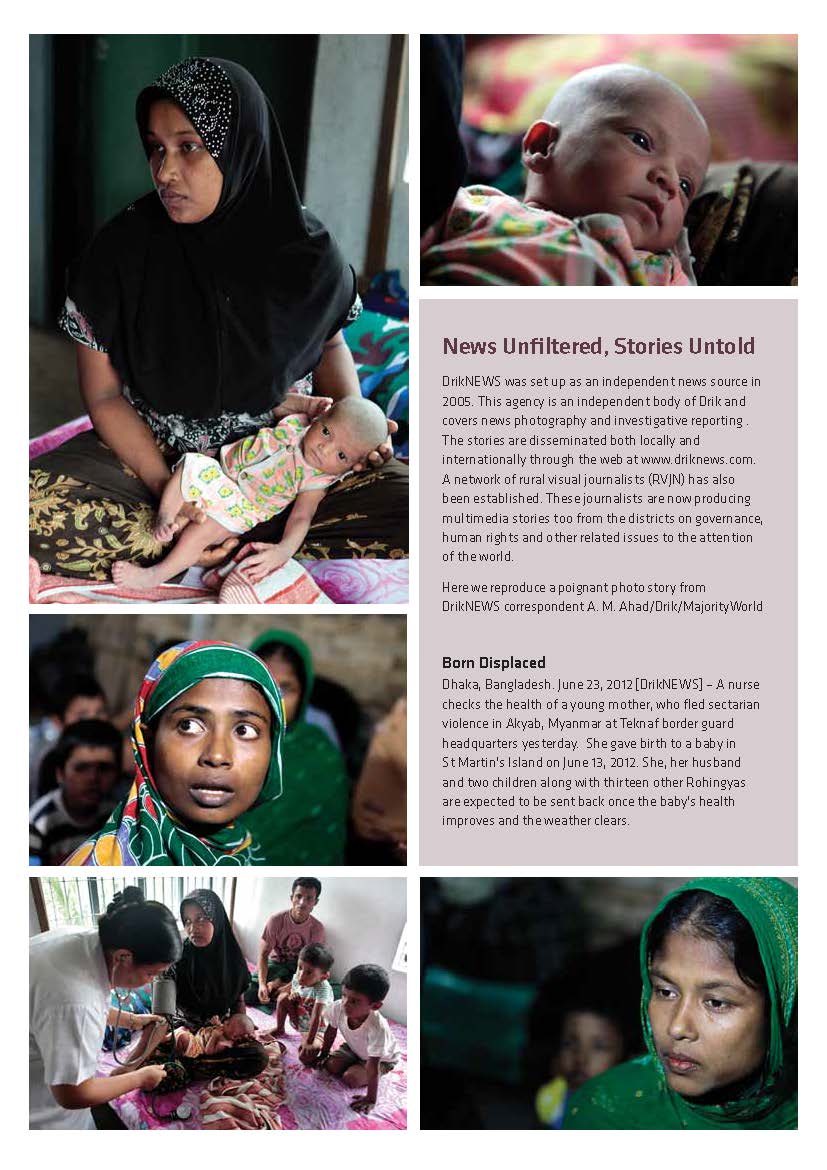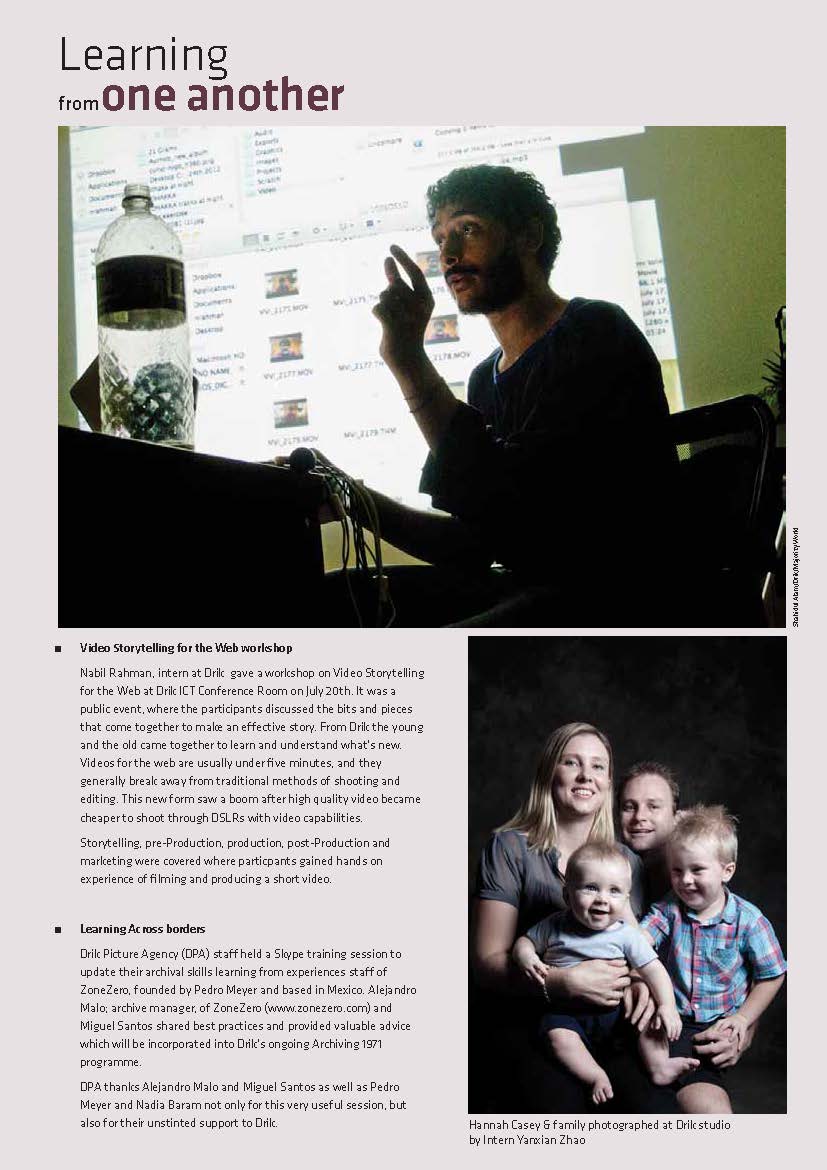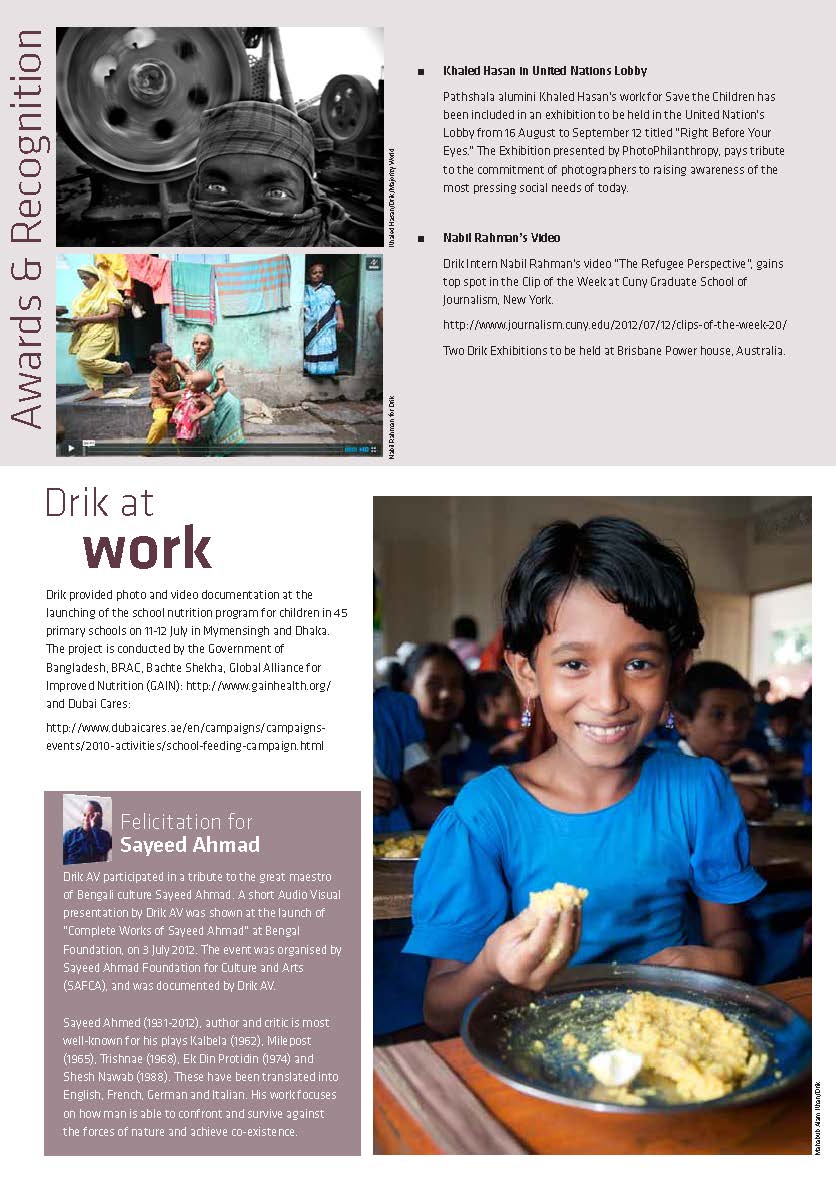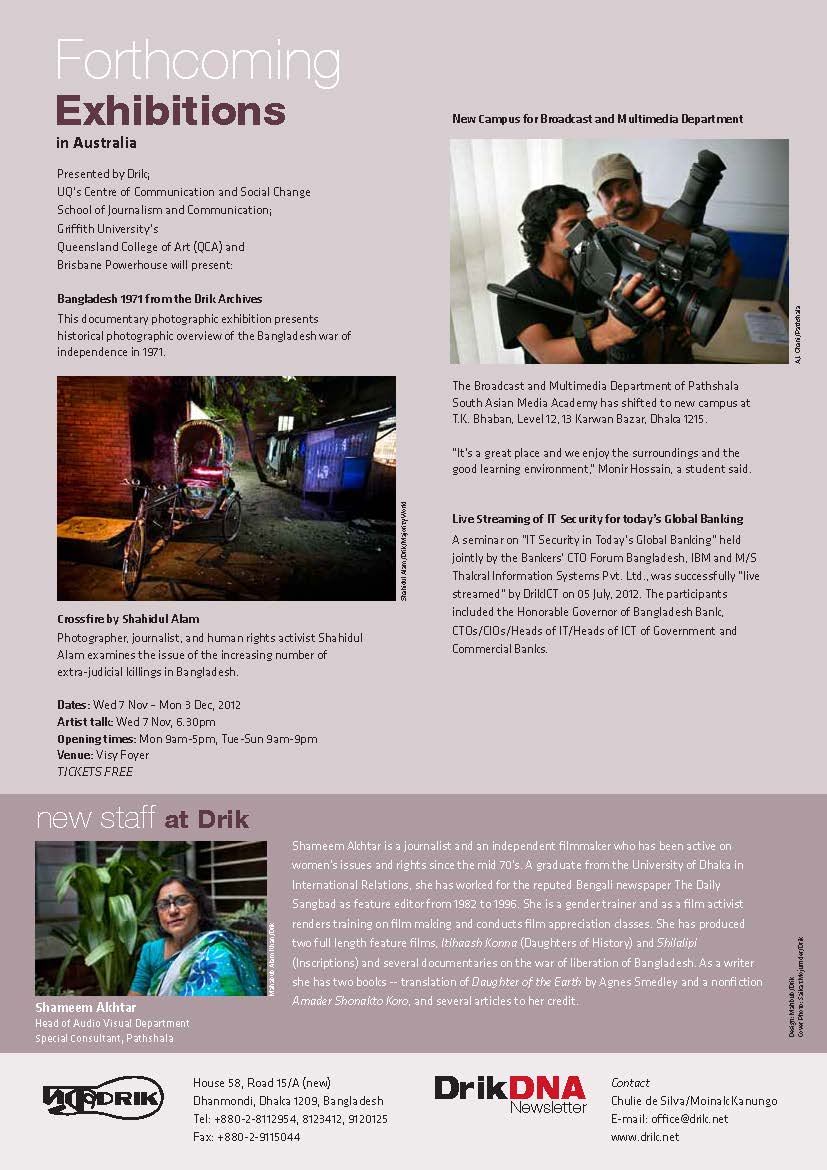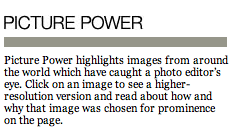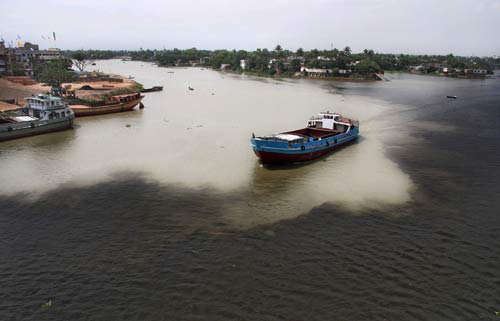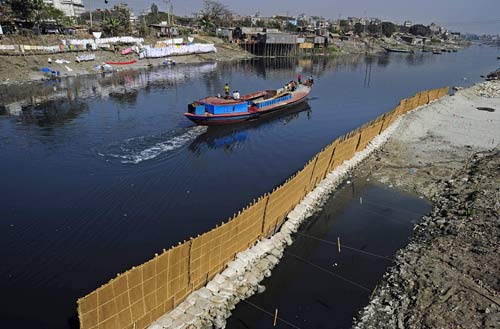The issues Nobel Laureate George Wald made in this 1979 interview, appear as pertinent today. The unrestrained pursuit of profit and production, have led to the formation of the biggest war machines.
Speaking at MIT in 1969 Wald bemoaned that “Our government has become preoccupied with death, with the business of killing and being killed.”
Tag: Environment
Drik DNA July 2012
Getting in the way
Razia Haque was incensed. She was not a trendy environmentalist. Her sentences weren?t interspersed with English and she didn?t know any of the developmental jargon. She was a grandmother who lived in Elephant Road who walked through the park everyday to drop off her granddaughter at the university. But she knew this was wrong. ?Nature is for everyone. What do they think they are doing? How many years has it taken for these trees to grow? They?ve destroyed the beauty of this place. They?ve dulled our senses. It can only cause bitterness. About common people, about the government about everyone. They do as they please. How can you allow this? You should all give slogans. Who has authorised the cutting of these trees? Once the trees have gone there?s nothing you can do. Just because they?re in power they?ll cut down the trees, how can that be??
Continue reading “Getting in the way”
Blog Competition
?Green bloggers: win a trip to Brazil to cover World Environment Day 2012, on June 5!?
The United Nations Environment Program (UNEP), in partnership with?TreeHugger, is yet again sponsoring a free trip to Brazil for a winning blogger to write, blog and tweet aboutWorld Environment Day.
Bloggers are invited to enter competition via online submissions of blog articles on the Green Economy. The top ten bloggers, selected by a UNEP-TreeHugger?jury, will be invited to a second round of blogging ? blogdown!
The winner of this online showdown (blogdown) will be determined by an online community via the World Environment Day website. Readers will ?like? any of the posts in order to win an extra vote for their favourite blogger.
The blogger who accumulates the most votes by the end of April 2012 wins the competition and will be invited to blog about World Environment Day in Brazil.
What?s included?
Flights, accommodation, visa costs and travel within Brazil to WED events will be covered.
Timing:
World Environment Day is on June 5th, 2012. The contest winner will be flown to Brazil for about three days, beginning June 3rd and ending June 6th 2012. Short-listed and winning posts will be published on?TreeHugger?and the World Environment Day websites.
Costs:
Entrants will be expected to ensure they are able to travel to Brazil for the duration and cover any other costs (e.g. vaccinations).
Bird show at NID campus
I don’t get distracted easily, but the spectacular air show in the skies above the football field at the NID campus in Ahmedabad, India, made portfolio reviews difficult.
Sit back, relax, and enjoy this clip on full screen.
My Best Shot
Subscribe to ShahidulNews
Guardian 16th October 2011
Photographer Shahidul Alam’s best shot
‘The fisherman told me the river is a destructive animal. It had destroyed his home many times’

-
- Interview by?Sarah Phillips
- guardian.co.uk, Sunday 16 October 2011 22.29 BST
- Article history
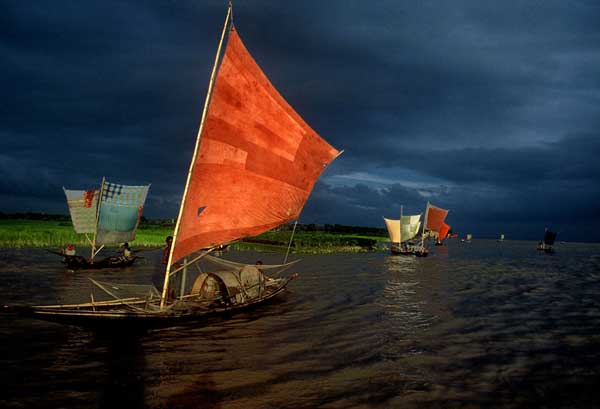
In Bangladesh, there were once over 800 species of riverboats, most of which have now disappeared, largely because of the advent of motorboats and changing lifestyles. But during the monsoon, fishermen still go out to catch a particular fish called?ilish, which is a delicacy in Bangladesh. To the connoisseur, it is the ilish of this particular river that is said to be the only type that matters.
I took a fishing boat along the river from Daulatdia, but at first the light was terrible, so I decided to?wait. I stayed with a fisherman in his home, and we went out for three days. On the third day, as sometimes happens during the monsoon, there was this shaft of light that shone through a small gap in the dark cloud formation. A red sail just?happened to be there, and for several minutes became luminescent. It was absolutely a fortunate moment, but I had been waiting for it to happen.
The fisherman told me that, while the river is very much part of his?life, it is also a very destructive animal. His home, which is very close to its bank, has been destroyed many times. That didn’t deter him, though ? the river is his life. He gave me ilish to?take home, and it was as good as I’ve ever had.
We tend to think of the river as a geographical entity. I think it is much more than that: it is something that connects humanity. My picture captures a fading way of life, unique to the Bangladeshi landscape.
CV
Born: Dhaka, Bangladesh, 1955.
Influences: A man you will never have heard of, who I always see in Dhaka. He and his son are scavengers. I’ve seen him do it for years with a quiet dignity that I admire immensely.
High point: There was the time in my life when I had the choice of making an easy living and I was able to resist it.
Low point: The death of my brother when I was 15.
- Shahidul Alam: My Journey as a Witness
- Wilmotte Gallery at Lichfield Studios,
- London
- Until 18 November
- Details:020-8968?3333
- Venue website
Picture Power
Subscribe to ShahidulNews
World Press Photo Enter Magazine |
||||||||||||
|
||||||||||||
|
||||||||||||
The Great Hiroshima Cover-up
Subscribe to ShahidulNews
By Greg Mitchell
The Nation
In the weeks following the atomic attacks on Japan sixty-six years ago this week, and then for decades afterward, the United States?engaged in airtight suppression of all film shot in Hiroshima and Nagasaki after the bombings. This included vivid color footage shot by U.S. military crews and black-and-white Japanese newsreel film.
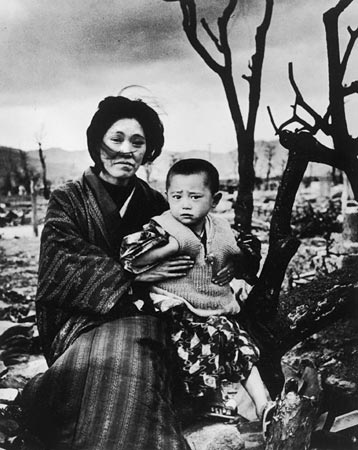
The public did not see any of the newsreel footage for twenty-five years, and the shocking US military film?remained hidden for nearly four decades. While the suppression of nuclear truths stretched over decades, Hiroshima sank into ?a kind of hole in human history,? as the writer Mary McCarthy observed. The United States engaged in a costly and dangerous arms race.?Thousands of nuclear warheads remain in the world, often under loose control; the United States retains its ?first-strike? nuclear policy; and much of the world is partly or largely dependent on nuclear power plants, which pose their own hazards.
Our nuclear entrapment continues to this day?you might call it ?From Hiroshima to Fukushima.?
The color US military footage would remain hidden until the early 1980s, and has never been fully aired. It rests today at the National Archives in College Park, Maryland, in the form of 90,000 feet of raw footage labeled #342 USAF. When that footage finally emerged, I spoke with and corresponded with the man at the center of this drama: Lt. Col. (Ret.) Daniel A. McGovern, who directed the US military film-makers in 1946, managed the Japanese footage, and then kept watch on all of the top-secret material for decades. I also interviewed one of his key assistants, Herbert Sussan, and some of the Japanese survivors they filmed.
Continue reading “The Great Hiroshima Cover-up”
Coal Climate Showdown in Bangladesh
Subscribe to ShahidulNews
Coal Climate Showdown in Bangladesh

LIVING WAGES FOR GARMENT WORKERS
Subscribe to ShahidulNews
Malik-speak: Demonisation and Denial
By Rahnuma Ahmed
I don’t think anyone gets taken in by what they say. No, not any longer.
Not unexpected, for after all, how long can one spin the same old story and expect people to fall for it. Day after day. Year after year.
Even prime minister Sheikh Hasina had sounded exasperated. Factory owners, she said, give garment workers “not only insufficient but also inhuman” wages.
Coming from someone who heads a government which, as Shahidullah Chowdhury, president, Bangladesh Trade Union Centre, points out, is “essentially biased” towards protecting and promoting the interests of the rich (like all previous governments in Bangladesh), her comment is quite revealing.
Industry leaders, of course, had a fit. Labour unions had demanded 5-6,000 taka, owners grudgingly agreed to 3,000 taka. Far below living wages. But as Anisul Huq, former head of BGMEA (Bangladesh Garment Manufacturers and Exporters Association), a factory owner whose clients include H&M and Wal-Mart, ruefully told the New York Times, ?If it?s 5,000 taka, I would close all my factories.? He added, ?Even if it?s 3,000 taka, lots of factories will close within three or four months? (July 16, 2010).
One cannot, of course, deny that the government needs to take measures to strengthen Bangladesh’s most successful manufacturing industry which accounts for 80% of annual export earnings. For one, it needs to ensure uninterrupted power supply. Abdus Salam Murshedy, the head of BGMEA, in an attempt to convince workers to accept 1,969 taka as wages said last June, “We have been reeling under acute gas and power crisis, which has affected our productivity.” http://www.thefinancialexpress-bd.com/more.php?news_id=103553&date=2010-06-19
Second, it also needs to takes measures to bring down escalating food prices, as food inflation matters most to minimum wage garment workers. In May last year, rice prices went up by between 18% and 32%, according to the Trading Corporation of Bangladesh.
But in defiance of Bangladesh labour laws which dictate that wages should be reassessed and adjusted every three years, recent wage increases were awarded after 2006. After spilling blood. They have been dubbed “malnutrition” wages by some, “poverty” wages by others.
The acute shortage of electricity, insists B D Rahmatullah, former director general of the Power Cell (ministry of power, energy and mineral resources), is a “manufactured” crisis.?As a former insider, he should know; further, no one from the energy ministry has contested his allegation. One cannot help but ask, why would a government electorally committed to increasing and stabilising power generation, manufacture a crisis, much to the detriment of people’s, and industrial interests? WikiLeaks leaked Dhaka US Embassy cables incline me to suggest that the manufactured crisis is possibly aimed at rallying public support for awarding oil, gas and coal contracts to foreign companies (People’s Resistance to Global Capital and Government Collaboration is Vindicated, New Age December 27, 2010).
As for the food crisis, according to the Election Manifesto of Bangladesh Awami League-2008, “commodity prices increased by 100 to 200 percent” during the BNP Jamaat alliance rule (2001-2007), the “infamous Hawa Bhaban” under the “leadership of the son of the [former] Prime Minister [Khaleda Zia]” patronised “criminal syndicates.”?All true, but although the ruling party has changed, although Hawa Bhaban which ran a “parallel government” no longer exists, food syndicates still do. Fourteen months after taking power, finance minister AMA Muhith declared, a “cartel or syndicate of traders” is responsible for price hikes of essentials including rice, that the government was “seeking ways and means to stabilise the market” (February 2010).
Six months later, it seems the government had stopped seeking ways and means, for as Muhith stated, government attempts to break up the syndicate had failed (August 12, 2010). http://www.bdnews24.com/details.php?id=170547&cid=2
It is obvious that the “rich” interests which the Awami League government protects and promotes extends not only to the garment sector but also to oil, gas, coal and food. That the government is committed to serving the interests of global and local capital. Not those of the majority. Not those who voted it to power.
It should also be obvious that the rich of one sector collude with the rich of another. At a reception in May 2008, accorded by the Chittagong Chamber of Commerce and Industry (CCCI) and BGMEA to the newly-elected office bearers of FBCCI, the apex chamber body, the newly-elected FBCCI president Anisul Huq and other business people, urged the government to take immediate steps for exploring coal and gas to overcome the energy crisis, to put an end to the debate on the coal policy, to go for open-pit coal mining (Daily Star, May 3, 2008).
Environmental activists say, the latter will lead to the forcible eviction of not 1,30,000 people as the government commissioned report claims, but ten times more, that it will wreck the environment. But those at the Chittagong reception seemed to shrug off these concerns, affected people could “easily be rehabilitated.”
“We are not blood-suckers,” he said excitedly, a young garment factory owner, whose name I’m afraid I couldn’t catch, he was on a talk show on a private TV channel, it was midway through, this was nearly 3 weeks ago. All this talk of “capitalism” and “exploitation” portrays us in a bad light. I refuse to listen to all this. I’ll walk out right now, he said, jerking his head toward what was presumably the studio door. While MM Akash, professor of economics, Dhaka University, sat silently grinning, while the anchor of the programme desperately tried to restore peace, I sat open-mouthed at the TV screen. Huh, and I’d thought all our drama queens belonged to the parliament.
Over the last few weeks, I have had the fortune to watch two other live TV programmes graced by factory-owners. I didn’t know whether to laugh or to cry when I heard AK Azad, president of FBCCI, chairman of Ha-Meem Group, fifth largest clothing manufacturer in Bangladesh, a big supplier of readymade garments for Gap, whose That’s It Sportswear at Ashulia caught fire last December leading to the death of 23 workers,?insist that safety measures were meticuloulsy followed in his factories. There were regular fire drills but since they were `merely’ drills with no real fires, it had been difficult to foresee and prevent the deaths. Where on earth are real fires lit during drills?
And yes, both Azad, and later, in another TV programme, Anwar-Ul-Alam Chowdhury Parvez, former BGMEA president, owner of Evince Group, insisted (seemingly speaking from the same script), the new wage structure is being followed in their factories, in all other factories that they know of, to say otherwise is a smear campaign, out to malign the industry. They spoke in a voice of benevolence, their workers were happy, contented, well-looked after. Parvez got a bit carried away, I never fail to address them as my children, I call them baba, ma, but he quickly fell silent when the anchor interjected, `but, how does that affect the wages paid?’
Factory owners’ self-construction as benevolent, kind, concerned and caring, as is evident from the discourse of BGMEA leaders, reminds me of colonial discourses since workers are simultaneously constructed as passive and backward, who are easily amenable to being `incited’ and `instigated,’ who turn `violent,’ go `berserk,’ on a `rampage,’ who vandalise, loot and destroy. They need to be pacified, and to do so,? an industrial police force has been established (October 2010). To maintain “law and order” in the export processing zones (EPZ), said the prime minister, to help maintain “smooth and uninterrupted productions” at mills and factories.
Even though leaders admit at times that there may be a few bad apples among the owners who give the industry a bad name, as a collective, they authoritatively claim to represent the nation’s interest, for it is they who are taking the nation forward, who have strengthened the national economy. The garment industry is a national resource, they say, but in contemporary business speak, as Lucy Kellaway writes, ownership is the biggest lie of all.?Using the “national good” as a rhetorical device covers “private advantage,” simply using the word “nation” does not make one “nationalists” (David Burrow).
Genuine worker grievances?rising from meagre wages, by all accounts, far short of living costs, and “notoriously” bad safety records?are covered up by speeches, both by factory owners and political leaders, who point fingers at “foreign” forces bent on sabotaging the nation’s progress, at vested quarters attempting to spread anarchy, at creating terror. Foreign, one must note, are both good and bad, the good ones are those that the owners are aligned to, foreign buyers, foreign investors, while the baddies are international labour rights and human rights organisations with whom local and national groups network to fight against grave injustices toward Bangladesh’s garment workers, who have the privilege of receiving the lowest wages in the highest earning industrial sector. The only industrial sector in Bangladesh which, since its inception, has been wracked by labour unrest, one which often enough spills out into city streets, whether in Dhaka, or Chittagong or Narayanganj, which disrupts public life, causes death and injury to members of the public (on December 12, 2010, a rickshaw driver was killed when police fired at demonstrating workers in Chittagong EPZ), and severe financial losses (cars set alight, buses torched).
But BGMEA enjoys the blessings of prime ministers both past and present. During her first tenure as prime minister, Sheikh Hasina, had inaugurated the construction of BGMEA Bhaban in November 1998. After completion, in October 2006, the building was inaugurated by then prime minister, Khaleda Zia.
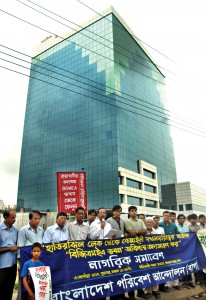
The 15-story structure, standing tall, is illegal,?having been built on land that is government-owned, without approval from Rajuk, the city development authority, land which had been set aside for the Begunbari-Hatirjheel integrated development project. Having been built on land filling that was a part of the Hatirjheel lake, in gross violation of two laws, including the Environment and Wetland Protection Act 2000, it is said to be the main reason for chronic and severe waterlogging in Dhaka city. Urban experts, academicians and environmentalists have repeatedly called on the government to demolish the BGMEA building because it is right in the middle of the canal, it “defies the law in the heart of the city,” it inspires others to violate the law (Abdullah Abu Sayeed).
BGMEA’s vice president Shafiul Islam Mohiuddin’s response, the government must decide which is more important, the lake or the BGMEA, rests on the language of power. That of environmentalists, as do those of garment workers and their leaders, speak of justice. The law requires Rajuk to go ahead and demolish the building without waiting for a political decision, says noted environmentalist and director of Bangladesh Environmental Lawyers Association (BELA) Rezwana Hasan. ?If law is subject to politics, justice can never be ensured.?
I myself don’t understand what all the fuss is about. If the affected people of Phulbari can “easily be rehabilitated,” surely, so can the BGMEA headquarters? Maybe it is time BGMEA leaders and members learnt to live by the law, not to bend it to serve their own sweet will. It is only then that their claims of being committed to “national interests” will be honored by the public.
Published in New Age, Monday January 17, 2011


